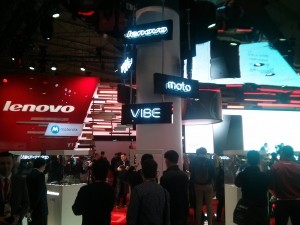 Top Chinese PC maker Lenovo (HKEx: 992) has just announced some impressive results, saying recent acquisitions in Germany and Japan helped to lift its profit 60 percent in its latest fiscal quarter, as revenue rose an equally strong 54 percent. (Earnings announcement) But as a long-time China watcher, my first reaction is: I’ve seen this before, as the company’s results also got a quick boost back in 2006 after its ground-breaking purchase of IBM’s (NYSE: IBM) PC assets, which instantly gave its revenue a major boost with a large new global presence. But history watchers will also remember that honeymoon period was relatively short lived, and Lenovo later suffered big losses and launched a major reorganization after many of IBM’s former clients defected and it couldn’t efficiently run IBM’s overseas operations. So the question now becomes, are we going to see an encore performance of the IBM deal, which would see Lenovo’s fortunes rapidly fall and end with another reorganization; or will it learn from its previous IBM experience and this time do better, perhaps even achieving its goal of overtaking Hewlett-Packard (NYSE: HPQ) to become the world’s largest PC company? Before I gave my answer, let’s take a quick look at the big picture, starting with the latest acquisitions that saw Lenovo purchase German PC maker Medion and take over the PC operations of Japan’s NEC (Tokyo: 6701) last year. The US may have been a difficult labor market for Lenovo, but the challenges there will seem small compared to what it will face in Japan and Germany, the former due to its tradition of companies providing lifetime employment to workers and the latter due to its strong labor unions. Those kinds of labor issues were largely behind the failure of TCL’s (HKEx: 1070) purchase of a French TV maker and the purchase of Siemens’ (Frankfurt; SIEGn) cellphone assets by Taiwan’s BenQ nearly a decade ago. Lenovo was a little smarter this time in Japan, taking over NEC’s PC operations through a joint venture rather than an outright purchase, meaning NEC will remain as a partner to help to run the operation. But TCL also tried the joint venture approach with France’s Thomson, and clearly that didn’t work. In terms of customer defections, I would also expect those to start happening soon. In this case, the defections could be even worse, since Japanese and German consumers and businesses are especially quality conscious, and are unlikely to like the idea that they are buying computers from a Chinese company instead of a German or Japanese one. All that said, look for both of these acquisitions to run into problems, with labor issues likely to flare up in the next year and customer defections to accelerate as corporate purchasing contracts expire. The situation could become worse as many of Lenovo’s recent forays into new product areas are also likely to run into trouble, meaning the company could quickly see its new zooming top and bottom lines start to stumble, setting the stage for yet another reorganization in the next 2-3 years.
Top Chinese PC maker Lenovo (HKEx: 992) has just announced some impressive results, saying recent acquisitions in Germany and Japan helped to lift its profit 60 percent in its latest fiscal quarter, as revenue rose an equally strong 54 percent. (Earnings announcement) But as a long-time China watcher, my first reaction is: I’ve seen this before, as the company’s results also got a quick boost back in 2006 after its ground-breaking purchase of IBM’s (NYSE: IBM) PC assets, which instantly gave its revenue a major boost with a large new global presence. But history watchers will also remember that honeymoon period was relatively short lived, and Lenovo later suffered big losses and launched a major reorganization after many of IBM’s former clients defected and it couldn’t efficiently run IBM’s overseas operations. So the question now becomes, are we going to see an encore performance of the IBM deal, which would see Lenovo’s fortunes rapidly fall and end with another reorganization; or will it learn from its previous IBM experience and this time do better, perhaps even achieving its goal of overtaking Hewlett-Packard (NYSE: HPQ) to become the world’s largest PC company? Before I gave my answer, let’s take a quick look at the big picture, starting with the latest acquisitions that saw Lenovo purchase German PC maker Medion and take over the PC operations of Japan’s NEC (Tokyo: 6701) last year. The US may have been a difficult labor market for Lenovo, but the challenges there will seem small compared to what it will face in Japan and Germany, the former due to its tradition of companies providing lifetime employment to workers and the latter due to its strong labor unions. Those kinds of labor issues were largely behind the failure of TCL’s (HKEx: 1070) purchase of a French TV maker and the purchase of Siemens’ (Frankfurt; SIEGn) cellphone assets by Taiwan’s BenQ nearly a decade ago. Lenovo was a little smarter this time in Japan, taking over NEC’s PC operations through a joint venture rather than an outright purchase, meaning NEC will remain as a partner to help to run the operation. But TCL also tried the joint venture approach with France’s Thomson, and clearly that didn’t work. In terms of customer defections, I would also expect those to start happening soon. In this case, the defections could be even worse, since Japanese and German consumers and businesses are especially quality conscious, and are unlikely to like the idea that they are buying computers from a Chinese company instead of a German or Japanese one. All that said, look for both of these acquisitions to run into problems, with labor issues likely to flare up in the next year and customer defections to accelerate as corporate purchasing contracts expire. The situation could become worse as many of Lenovo’s recent forays into new product areas are also likely to run into trouble, meaning the company could quickly see its new zooming top and bottom lines start to stumble, setting the stage for yet another reorganization in the next 2-3 years.
Bottom line: Lenovo could soon see history repeat, with strong results after 2 recent acquisitions setting the stage for integration difficulties and an eventual reorganization.
Related postings 相关文章:
◙ Lenovo’s TV Gamble: Failure Ahead? 联想电视赌注:未来会失败吗?
◙ TCL Cellphones: History Repeats Itself TCL手机业务历史重演
◙ Lenovo Completes Leadership Change, Yang Uninspired 联想完成高层调整,杨元庆难鼓舞人心

 Japan’s foreign minister was in China yesterday on an official visit, so I thought I’d start the week with 2 items on Chinese companies in the notoriously difficult Japanese market, including an interesting move into the chip sector by a sister company of PC giant Lenovo (HKEx: 992) and a hasty retreat by e-commerce giant Alibaba. Let’s start with the more intriguing of the items, which is seeing Hony Capital, the high-profile technology investment arm of Lenovo parent Legend Group, pairing with US private equity giant TPG Capital to make a planned bid for bankrupt memory chipmaker Elpida (Tokyo: 6665), according to a Japanese media report. (
Japan’s foreign minister was in China yesterday on an official visit, so I thought I’d start the week with 2 items on Chinese companies in the notoriously difficult Japanese market, including an interesting move into the chip sector by a sister company of PC giant Lenovo (HKEx: 992) and a hasty retreat by e-commerce giant Alibaba. Let’s start with the more intriguing of the items, which is seeing Hony Capital, the high-profile technology investment arm of Lenovo parent Legend Group, pairing with US private equity giant TPG Capital to make a planned bid for bankrupt memory chipmaker Elpida (Tokyo: 6665), according to a Japanese media report. ( There’s interesting news that Lenovo (HKEx: 992) the world’s second largest PC maker, may move some of its production to Japan — a step that at first glance seems to totally contradict global trends that have seen PC makers relocate nearly all their manufacturing to developing markets like China and Vietnam in recent years. (
There’s interesting news that Lenovo (HKEx: 992) the world’s second largest PC maker, may move some of its production to Japan — a step that at first glance seems to totally contradict global trends that have seen PC makers relocate nearly all their manufacturing to developing markets like China and Vietnam in recent years. ( The folks at Lenovo (HKEx: 992) are surely celebrating, after the latest numbers showed it zoomed past sputtering Taiwanese PC maker Acer (Taipei: 2353) to take the spot as the world’s third largest PC seller in the second quarter. (
The folks at Lenovo (HKEx: 992) are surely celebrating, after the latest numbers showed it zoomed past sputtering Taiwanese PC maker Acer (Taipei: 2353) to take the spot as the world’s third largest PC seller in the second quarter. ( Don’t do it! Those are the only words of advice I can offer Lenovo (HKEx: 992) Chairman and founder Liu Chuanzhi, whose latest comments indicate his is weighing a possible bid for the PC assets that global leader Hewlett-Packard (NYSE: HPQ) is putting up for sale. (
Don’t do it! Those are the only words of advice I can offer Lenovo (HKEx: 992) Chairman and founder Liu Chuanzhi, whose latest comments indicate his is weighing a possible bid for the PC assets that global leader Hewlett-Packard (NYSE: HPQ) is putting up for sale. ( Leading Chinese PC maker Lenovo (HKEx: 992) has finally discovered a winning formula, beating market expectations with a profit that doubled in its latest fiscal quarter on the back of strong sales in its core emerging markets business. (
Leading Chinese PC maker Lenovo (HKEx: 992) has finally discovered a winning formula, beating market expectations with a profit that doubled in its latest fiscal quarter on the back of strong sales in its core emerging markets business. (